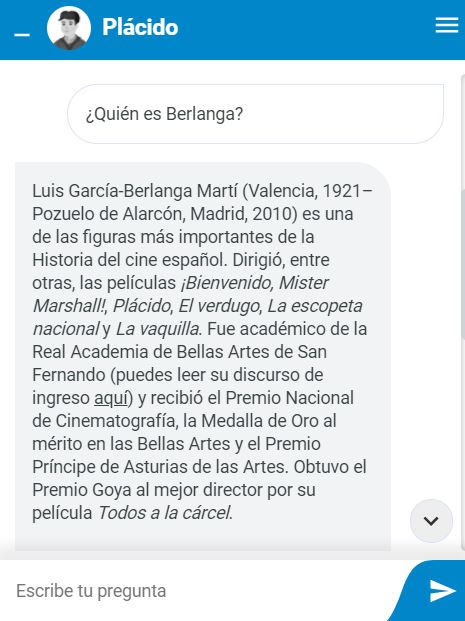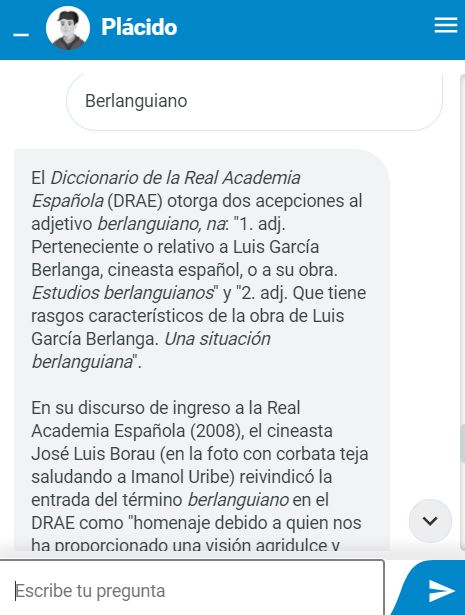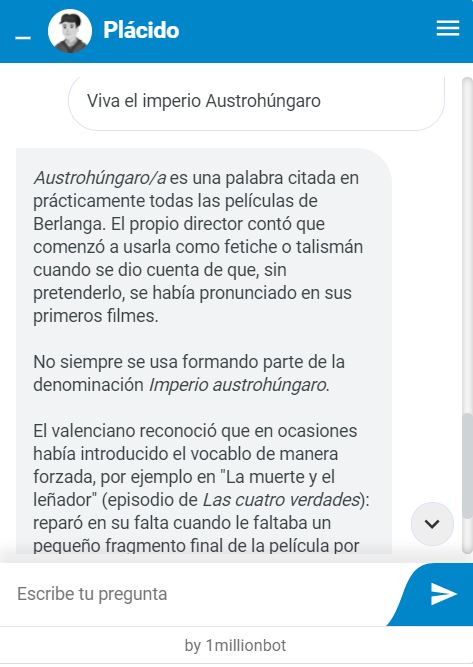
This year we are celebrating the centenary of the Valencian filmmaker Luis García Berlanga (1921-2010). Much has been published about him and about different aspects of his life and his work. In addition, Berlanga is in our collective memory with terms, images and characters that we often do not know come directly from the work of the Valencian artist. However, It is not easy to write about Berlanga. Therefore, it is better to ask for help.
Plácido may be the best companion to write "with four hands" about a man as complex as Berlanga. We don't mean talking to the character in one of his most important movies. That would be another type of article. We refer to the young Placido. It is the chatbot developed by 1millionbot to disseminate the life and work of the Levantine author in the year of his centenary.
Berlanga, four hands

What do you want to know about Berlanga? Enter this very special chabot. Visit the page of Berlanga Film Museum, and ask Placido. He responds with a complete biographical file with which you can get a first idea of who Luis García Berlanga was. That simple, that rich, that special. Start writing.
For example, start to give shape to an article in which you review his films. But, does Emma Penella appear in Plácido? No, Penella appears in 'El Verdugo', Plácido tells us thanks to the file and the film's trailer. You doubt if, in this film, they go to Mallorca or Benidorm on vacation. Again the file and access to some unique photographs of the shooting stored in the Berlanga Film Museum.

Writing about Berlanga with a chatbot could even be Berlangian. If you have doubts about the word, what it means and if it is included in the dictionary, well, go ahead. For this reason, you ask Plácido and he answers that it is included, since 2020. But it does not stop there, Plácido answers that the filmmaker José Luis Borau defined it as «expression of absurd situations, caustic comedy and grotesque approaches that sometimes proliferate in a society that is difficult to put into the picture».
An interesting and rigorous piece is being left but there is still the end. You had thought to end that of "Long live the Austro-Hungarian Empire!". Actually you know it's from Berlanaga but you don't know where it comes from. Wait until we ask Plácido. He tells us that it is not always used as part of the Austro-Hungarian Empire denomination but that he did use it as a talisman. If Berlanga did it, so did we.

The placido project
The Ministry of Education, Culture and Sport of the Generalitat Valenciana, through the Valencian Institute of Culture (IVC) and with the development of 1millionbot are the drivers of the Plácido chatbot. It is an Artificial Intelligence assistant that serves, as we are seeing, to publicize the life and work of the Valencian filmmaker. This didactic tool is now available for use. It is freely accessible and free and it is a project that will grow with new content.
Plácido joins other experiences in which 1millionbot has participated as dulcineia, the chatbot developed to help, especially young people, to approach and read the first part of Don Quixote. This year the Cervantes Institute has signed an agreement with 1millionbot to be able to develop dissemination projects of the great heritage that the cultural institution treasures.
The smart solution
Virtual assistants based on Artificial Intelligence propose an intelligent solution regardless of the sector to which they are directed. Contact us to find out what a chatbot can do for your organization.
